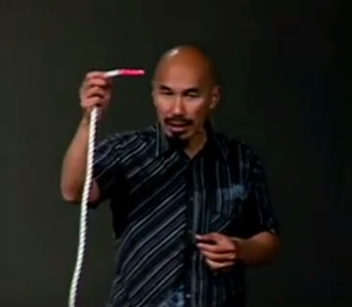In our house group recently we have been watching some of the video work of Pastor Francis Chan of California, USA. And while I’m not going to go into it in any detail here, suffice it to say that I recognise Francis Chan as someone who loves Jesus; there’s maybe a lot I don’t agree with in his teaching, but I really like the guy’s style and some bits have been interesting and thought-provoking. Plus, part of being a Christian is to learn to accept that others have a different viewpoint.
Anyway, one such interesting work is the ‘Rope Illustration’. In this, Francis takes a really long rope which has about a three-inch part at one end that is wrapped in red tape, probably a standard rope end to stop it fraying. Francis’s point is that if you imagine the rope as a timeline, and the length of the rope represents eternity, then the red end of the rope represents our brief life here on earth. And so, he contests, why put so much of our focus into the tiny span of our lives here, when the decisions we make here affect where we spend the rest of our own eternities after death?
In order to follow the rest of my piece, it’s probably best to take a look at the short movie I’m referring to; it’s quite interesting and only lasts a few minutes:
Now I get what he means, particularly because he’s someone who (As far as I can see) believes in – and preaches – the standard evangelical model of a black-and-white heaven/hell destiny for all souls for all time, and where you have to make your mind up in the here and now which it’s gonna be. As my regular readers will know, I have some problems with that doctrine – but I still want to honour Pastor Chan as a fellow believer. I’m not going to knock him in this post (or indeed at all). And there are things you can learn from that video even if you don’t believe in that particular idea.
For me, though, I’d like to turn the idea on its head – and actually end up agreeing with Pastor Chan, albeit from a somewhat different direction.
Firstly, let’s notice that the bit of red electricians’ tape, or whatever it is, is wrapped round the rope itself. It’s the same rope that extends 100 feet; the core of the red-wrapped rope is still part of the rest of the length of rope. And this illustrates rather nicely the idea of ‘treasures in jars of clay’ (2Cor 4:7): the rope of eternity is at the core of our being right now and extends past our current lives and into the future. The eternal life of the future is already part of us – and is ours – now, and is at our very core. The idea of eternal life does not simply mean ‘lasting for ever’, it also means life of an entirely different quality than that lived by an unbeliever.

Actually it’s not so much that our lives here affect that greatly what happens in the future – it does, but that’s not what I’m talking about here; it’s more that what we are in the future greatly affects what happens here and now in our lives. Or at least it can do, and, if we are believers, it should do – this is what you might call the ‘normal’ Christian life. Bear with me here. Jesus came to bring us life in all its fulness, as He said in John 10:10 – “The thief comes only in order to steal, kill, and destroy. I have come in order that you might have life – life in all its fullness.” Jesus came to preach the nearness of the Kingdom of God and proceeded to demonstrate what that Kingdom is like in terms of wholeness, health and healing, and the immanent presence of God Himself amongst His people, upon whom His favour rested. That is the life that Christians are called to live and demonstrate.
So, you see, that hundred feet of rope is the identity we have as believers: we are eternal beings who are part of this world with the purpose of being Jesus to others, in bringing His Kingdom blessings into this present day. Because of that eternal future, and all the riches it contains, we can make a difference in this world, just as Jesus did. Jesus actually came to give real help to real people in the real world when He came, and we should be no different. Spiritualising it into a heaven/hell discussion is not what it’s about. Jesus’s life and teaching was about the Kingdom of God. Sure, He did speak to his listeners about things related to afterlife issues, but any non-prejudiced reading of the Gospels must show that Jesus was more concerned with how people relate to God and He relates to them in this life, not because of the threat of some sort of eternal punishment, but simply because He loves them and wants them to have life in all its fulness – eternal life – here in this life as a taster for what comes next after the physical death of our bodies.
If this were not the case, some may even ask the question, “What’s the point of staying here on earth when Heaven is going to be so much better? Why not obtain our salvation and then go enjoy it?” Well, we want to stay because, as I’ve said above, our job is to demonstrate Jesus to the world, by living life in the freedom that He’s already bought for us, and to let others see us working in that freedom. That’s what makes the Gospel attractive to those on the outside who look in – seeing the real joy of those set free to enjoy life to the full. Not the ‘gospel’ of an ‘angry god’ who has to be placated and really isn’t that keen on spending time with miserable sinners. Nothing could be further from the truth!
So, then, because we have the eternal perspective – knowing that our lives with Jesus will continue in this life and then through the veil into the unseen Kingdom – we do live differently in this life. That piece of long rope does make a difference how we live. Not so much that we adhere to some legalistic code of rules or believe exactly the ‘right’ things, but that we live a Kingdom life of wholeness and power, fed from our eternal identity, that infinitely long rope into the distant future, in Christ.

So actually I do agree with Pastor Chan in that the everlasting life is the most important, and yes it does influence how we live our lives in the here-and-now – but not in the sense that this life determines our eternal destiny. Our ‘today’ lives are important too, otherwise God wouldn’t have arranged things the way they are. Instead, it’s the other way round; because the eternal life is far bigger, more powerful and more significant than our earthly life, its influence extends into our everyday lives right now.
That’s what I call Good News!

Tony, I really like this. I very much agree with your point that “The idea of eternal life does not simply mean ‘lasting for ever’, it also means life of an entirely different quality than that lived by an unbeliever.”
And you are right, we are not here to yearn for a perfect eternity; we have a job to do, and that is to spread the good news of the kingdom so other can have a different quality of life in the ‘red part’.
Tim, I think we both bought our copies of the songsheet from the same vendor 😉